
The Parliaments were an American vocal quintet from Plainfield, New Jersey, United States. Originally formed in the back room of a barbershop in 1956, the quintet was named after the cigarette brand. The Parliaments initially performed doo-wop music; after some early personnel changes their lineup solidified with George Clinton, Ray Davis, Fuzzy Haskins, Calvin Simon, and Grady Thomas. Clinton was group leader and manager, and part owner of the barbershop where the group convened to entertain customers. The group later changed its style, evolving into the bands Parliament and Funkadelic, which found success in the 1970s.
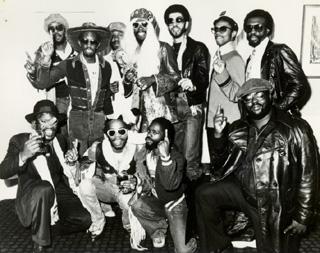
Parliament was an American funk band formed in the late 1960s by George Clinton as a flagship act of his P-Funk collective. Evolving out of an earlier vocal group, Parliament became associated with a more commercial and less rock-oriented sound than its sister act Funkadelic. Their work incorporated Afrofuturism concepts, horn arrangements, synthesizer, and outlandish theatrics. The band scored a number of Top 10 hits, including the million-selling 1976 single "Give Up the Funk ," and Top 40 albums such as Mothership Connection (1975).
The P-Funk mythology is a group of recurring characters, themes, and ideas primarily contained in the output of George Clinton's bands Parliament and Funkadelic. This "funkology" was outlined in album liner notes and song lyrics, in addition to album artwork, costumes, advertisements, and stage banter. P-Funk's "Dr. Seussian afrofunk" is often cited as a critical component of the Afrofuturism movement.
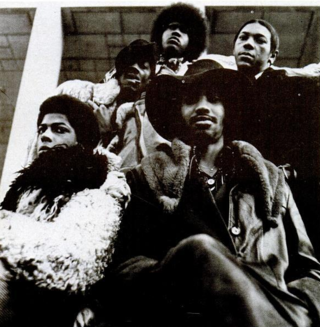
Funkadelic was an American funk rock band formed in Plainfield, New Jersey in 1968 and active until 1982. As one of the two flagship groups of George Clinton's P-Funk collective, they helped pioneer the funk music culture of the 1970s. Funkadelic initially formed as a backing band for Clinton's vocal group the Parliaments, but eventually pursued a heavier, psychedelic rock-oriented sound in their own recordings. They released acclaimed albums such as Maggot Brain (1971) and One Nation Under a Groove (1978).

Edward Earl Hazel was an American guitarist and singer in early funk music who played lead guitar with Parliament-Funkadelic. Hazel was a posthumous inductee to the Rock and Roll Hall of Fame, inducted in 1997 with fifteen other members of Parliament-Funkadelic. His ten-minute guitar solo in the Funkadelic song "Maggot Brain" is hailed as "one of the greatest solos of all time on any instrument". In 2023, Rolling Stone ranked Hazel at no. 29 in its list of 250 of the greatest guitarists of all time.
William "Billy Bass" Nelson is an American musician, who was the original bassist for Funkadelic. He is a member of the Rock and Roll Hall of Fame, inducted in 1997 with fifteen other members of Parliament-Funkadelic.

Cosmic Slop is the fifth studio album by Funkadelic, released in July 1973 on Westbound Records. While it has been favorably reevaluated by critics long after its original release, the album was a commercial failure, producing no charting singles, and reaching only #112 on the Billboard pop chart and #21 on the R&B chart. The album was re-released on CD in 1991.
Clarence Eugene "Fuzzy" Haskins was an American singer. He performed with 1950s and 1960s doo-wop group, The Parliaments, and was a founding member of the groundbreaking and influential 1970s funk bands Parliament and Funkadelic, also known as Parliament-Funkadelic. He left Parliament-Funkadelic in 1977 to pursue a solo career. He is a member of the Rock and Roll Hall of Fame, inducted in 1997 with fifteen other members of Parliament-Funkadelic. In 2019, he and Parliament-Funkadelic were given Grammy Lifetime Achievement Awards.

Standing on the Verge of Getting It On is the sixth studio album by Funkadelic, released on Westbound Records, released in July 1974. It is notable for featuring the return of guitarist Eddie Hazel.

Garry Marshall Shider was an American musician and guitarist. He was musical director of the P-Funk All-Stars for much of their history. He was inducted into the Rock and Roll Hall of Fame in 1997, with fifteen other members of Parliament-Funkadelic.
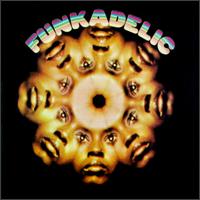
Funkadelic is the debut album by the American funk rock band Funkadelic, released in 1970 on Westbound Records.
Lucius "Tawl" Ross was an American musician. He was the rhythm guitarist for Funkadelic from 1968 to 1971, and played on their first three albums. He left the band in 1971 soon after a debilitating experience with LSD, which is reported to have resulted in brain damage. He moved back home to North Carolina and dropped out of the music scene, but resurfaced in 1995 after a nearly 25-year absence to release a solo album, a.k.a. Detrimental Vasoline - Giant Shirley, issued by Coconut Grove Records under the name Tal Ross.
Cordell "Boogie" Mosson was an American bassist who was a member of Parliament-Funkadelic. He was given a Lifetime Achievement Award Grammy in 2019.
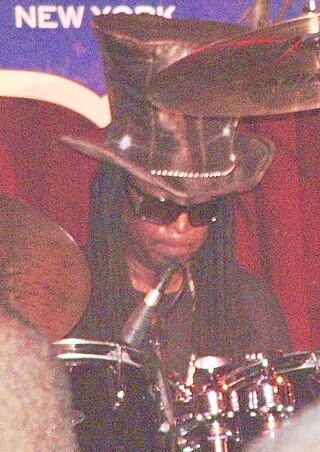
Jerome Eugene "Bigfoot" Brailey is an American drummer, best known for his work with P-Funk, which included the bands Parliament, Funkadelic, and numerous related projects. Brailey is a member of the Rock and Roll Hall of Fame, inducted in 1997 with fifteen other members of Parliament-Funkadelic.

Osmium is the debut album of American funk band Parliament, led by George Clinton. The album has a psychedelic soul sound with a spirit of experimentation that is more similar to early Funkadelic than the later R&B-inspired Parliament albums. It was originally released in July 1970 on Invictus Records. The original vinyl release contained a glossy lyric sheet.
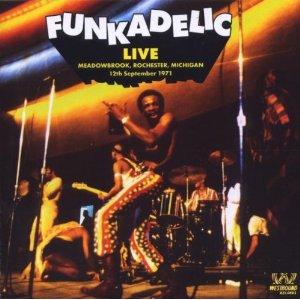
Funkadelic Live: Meadowbrook, Rochester, Michigan 12th September 1971 is a 1996 live release featuring the only official in-concert recording from early in the career of Funkadelic. Westbound Records owner Armen Boladian had decided to record the show without the band's prior notice, for a possible official live album release. Boladian then decided not to go forward with the project. The soundboard recording resided with engineer Ed Wolfram until being unearthed in 1996. The album contains the entire live performance of September 12, 1971, minus approximately three minutes of between-song chatter.

Motor City Madness is a compilation album by the American funk rock band Funkadelic, released in 2003 by Westbound Records. It features a selection of songs previously released on the band's original albums for Westbound from 1970 to 1976. The compilation's 29 tracks span the length of two discs. Music critic Robert Christgau has said that, "for those with the heart for it, this is their most listenable album."

U.S. Music with Funkadelic is a self-titled album consisting of tracks recorded in the early 1970s by the band United Soul with input from members of Funkadelic. The album was released by Westbound Records in 2009, and was licensed by Ace Records for its European release.

The Best of the Early Years, Volume 1 is a compilation album by the American Funk band Funkadelic. It was released on Westbound in 1977 while the label was distributed by Atlantic Records. The Best of the Early Years, Volume One compiles material from Funkadelic's tenure at Westbound from 1969 to 1974.













